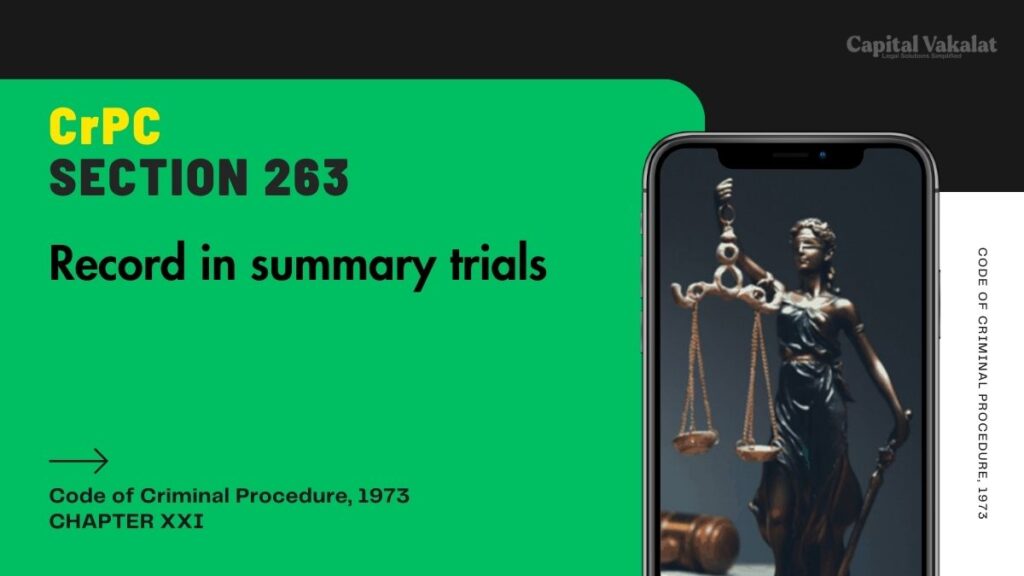Understanding the complexities of legal procedures is essential for anyone involved in the judicial process. One such critical aspect in the Indian judicial system is Section 263 of the Criminal Procedure Code (CrPC), which deals with the record-keeping requirements in summary trials. This section outlines the necessary documentation and processes that ensure transparency and efficiency in the summary trial system.

By delving into Section 263 CrPC, we can better grasp its importance, application, and the intricacies involved in maintaining records during summary trials.
Bare Act. Section 263 Cr.P.C.
Record in summary trials.
In every case tried summarily, the Magistrate shall enter, in such form as the State Government may direct, the following particulars, namely:--
(a) the serial number of the case;
(b) the date of the commission of the offence;
(c) the date of the report or complaint;
(d) the name of the complainant (if any);
(e) the name, parentage and residence of the accused;
(f) the offence complained of and the offence (if any) proved, and in cases coming under clause (ii), clause (iii) or clause (iv) of sub-section (1) of section 260, the value of the property in respect of which the offence has been committed;
(g) the plea of the accused and his examination (if any);
(h) the finding;
(i) the sentence or other final order;
(j) the date on which proceedings terminated.
The Significance of Section 263 CrPC
Overview of Summary Trials
Summary trials are streamlined judicial processes designed to expedite the administration of justice for minor offenses. These trials are quicker and involve fewer formalities compared to regular trials, aiming to reduce the burden on courts and deliver prompt justice. However, the efficiency of summary trials does not compromise the need for proper documentation, which is where Section 263 CrPC plays a crucial role.
Detailed Explanation of Section 263 CrPC
Section 263 CrPC outlines the specific records that must be maintained during summary trials. This includes a concise statement of the allegations, the defense raised by the accused, the evidence presented, and the judgment delivered. The meticulous record-keeping mandated by this section ensures that every trial, even if summary, adheres to principles of fairness and accountability.
Key Components of Section 263 CrPC
Record of Allegations and Defense
At the heart of Section 263 CrPC is the requirement to document the primary elements of the trial. This includes a clear statement of the allegations against the accused, providing a transparent basis for the proceedings. Additionally, the defense put forth by the accused must also be recorded, ensuring that their perspective is officially acknowledged and considered.
Evidence and Examination
Another critical component is the documentation of evidence and witness examinations. Even in a summary trial, the evidence must be meticulously recorded, including testimonies, physical evidence, and any other relevant material. This ensures that the trial’s outcome is based on a well-documented and reviewed body of evidence.
Judgment and Sentencing
Finally, Section 263 CrPC requires that the judgment and sentencing be clearly documented. This includes the rationale behind the judgment, the applicable laws, and the final sentence imposed. Such detailed documentation serves as a reference for any future reviews or appeals, reinforcing the trial’s integrity.
Practical Implications and Challenges
Ensuring Compliance
One of the practical challenges is ensuring that all judicial officers strictly adhere to the documentation requirements set forth by Section 263 CrPC. Proper training and continuous oversight are necessary to maintain high standards of record-keeping in summary trials.
Technological Integration
With advancements in technology, integrating digital record-keeping systems can significantly enhance the efficiency and accuracy of maintaining trial records. Implementing such systems can help in real-time documentation, reducing the chances of errors and omissions.
Section 263 CrPC: Record in Summary Trials
Case Study: Application of Section 263 CrPC
To illustrate the practical application of Section 263 CrPC, consider a case where an individual is accused of a minor theft. During the summary trial, the judge ensures that all allegations, defenses, evidence, and the final judgment are meticulously recorded as per Section 263 CrPC. This thorough documentation helps in maintaining transparency and provides a clear record for any future reference.
Ensuring Fairness and Transparency
By mandating comprehensive record-keeping, Section 263 CrPC plays a pivotal role in ensuring fairness and transparency in summary trials. It helps protect the rights of the accused while also providing a clear and accountable judicial process.
Best Practices for Record-Keeping in Summary Trials
Standardized Formats
One way to ensure compliance with Section 263 CrPC is by adopting standardized formats for record-keeping. These formats can provide clear guidelines on how to document various aspects of the trial, ensuring consistency and completeness.
Regular Audits and Reviews
Conducting regular audits and reviews of trial records can help identify any discrepancies or areas for improvement. Such practices ensure that the record-keeping process remains robust and aligns with the requirements of Section 263 CrPC.
Conclusion
In conclusion, Section 263 CrPC serves as a vital component in the judicial process of summary trials, ensuring that even these expedited procedures adhere to high standards of documentation and transparency. By understanding and implementing the requirements of Section 263 CrPC, judicial officers can maintain the integrity and efficiency of the summary trial system, ultimately contributing to a more just and accountable legal framework.